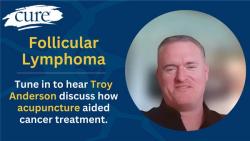When Others say Your Own Thoughts About Cancer Aloud
I'm a follicular lymphoma survivor, and hearing others name the quiet, lasting changes of life after cancer made me feel seen and understood.
I'm a blood cancer survivor; in July 2020, I was diagnosed with follicular lymphoma, which is considered highly treatable but chronic and incurable. The societal assumption that a cancer diagnosis is a death sentence is wrong; the overall five-year survival rate is nearly 70%. I was terrified when I was diagnosed because I thought I was going to die — and yet, I'm still here and still in remission. But there's always the fear of relapse, especially as, unlike many hard-tumor cancers, follicular lymphoma is highly likely to recur.
There are lots of articles about cancer - about the risks, about avoiding risks, about preparing to die following a cancer diagnosis. There are relatively few articles about surviving cancer. I know now that there are a lot of factors that impact cancer survival. One of the most significant is stage at diagnosis; the earlier a diagnosis occurs, the greater the chances of survival and the lower the chances of relapse. Recently, I’ve been seeing more articles about life after cancer — about picking up the pieces, if necessary (and it usually is), and going to live your life. When I see such articles, I think about telling my oncologist about plans I had made for a trip, and his answer: “Good. I saved your life so you could live it, not so you could sit at home doing nothing”.
This flies in the face of many stereotypes. People who have not experienced cancer, in themselves or in someone close to them, often picture cancer patients and survivors as seen in ads asking for donations — which often show frail-looking and yet happy people with no hair, wearing masks against the risk of infection. That’s true, and yet, it’s incredibly misleading; yes, I wore a mask during treatment, but I was treated during the height of the COVID pandemic — everyone was wearing a mask. I never did lose my hair; different types of treatment have different side effects.
When I see articles about cancer survivors today, they’re often about adventures the person went on, bucket list trips they took while they still could. But recently, I read an article written by a cancer survivor who went on to live her life — the life that cancer treatment interrupted, rather than a new and different life. Some things were the same, and some things were different. She kept the same job and spouse, and went on a vacation they had planned, but deferred during treatment. The article’s author noted that her basic emotions remained the same; she still loved the people she had loved before, and still enjoyed the same activities, but at the same time, some things about her life were irrevocably changed, such as medical checkups.
No matter how long ago a person was treated for cancer, they will always undergo extra checks for recurrence (back to that idea that early diagnosis leads to better outcomes); no matter how much a person’s life settles back into something approaching normal, there are constant reminders that it might just come back. Hearing someone else say that out loud — admitting that nothing would ever be quite the same again — was something I hadn’t encountered in print before. I have friends who’ve undergone cancer treatment who understand, but it wasn’t something I’d seen in mainstream media before. It had a significant and unexpectedly empowering effect on me, and I quite appreciate it.
For more news on cancer updates, research and education, don’t forget to subscribe to CURE®’s newsletters here.
Related Content
 How Mantras Impacted My Life During a Colon Cancer Journey
How Mantras Impacted My Life During a Colon Cancer JourneyFebruary 6th 2026
 A Brain Tumor Survivor’s Diagnosis Dilemma
A Brain Tumor Survivor’s Diagnosis DilemmaFebruary 3rd 2021
 How to Become a Cancer Survivor and Transforming Patients into People
How to Become a Cancer Survivor and Transforming Patients into PeopleFebruary 4th 2026
 The Benefits of a Pet When Dealing With Cancer
The Benefits of a Pet When Dealing With CancerFebruary 2nd 2026
View additional resources on CureToday.com












